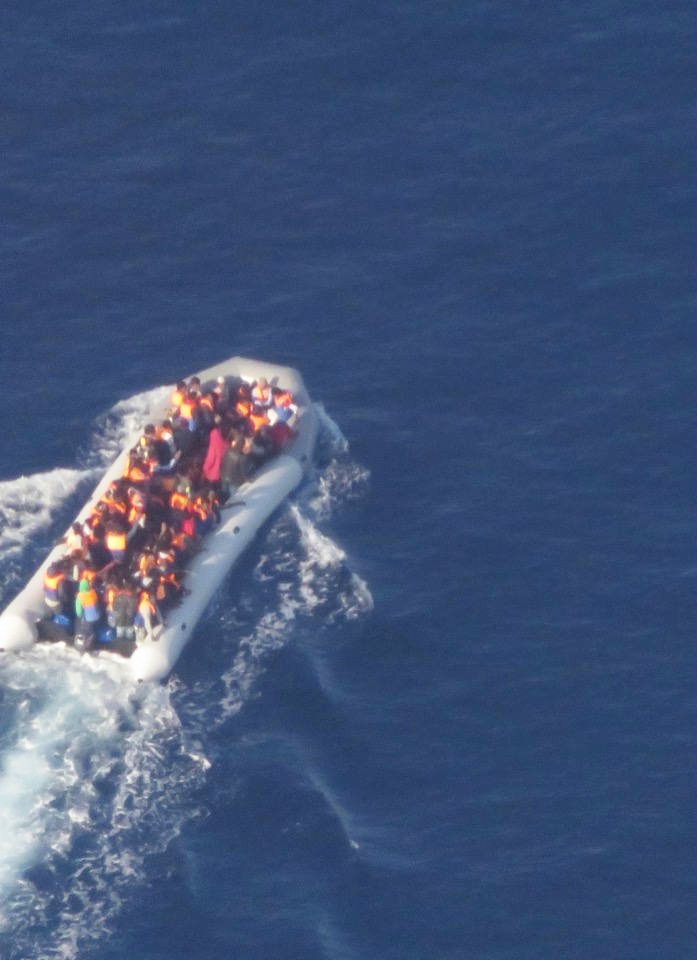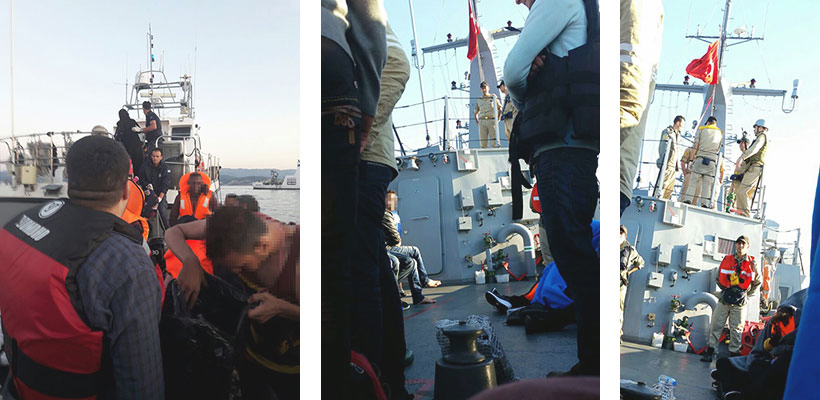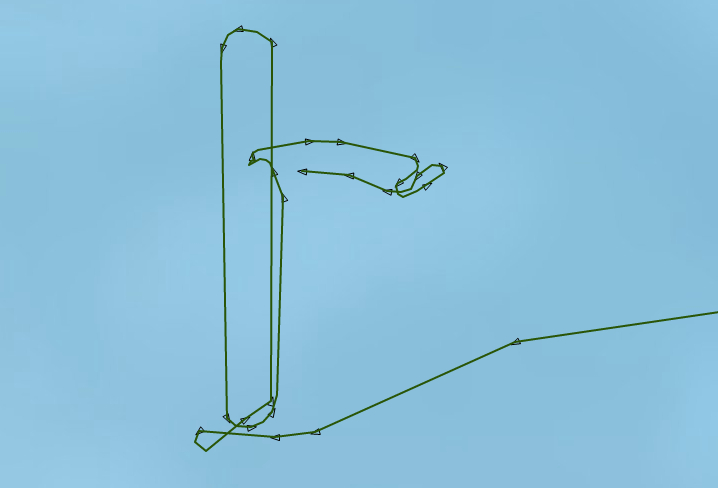Maurice Stierl

The Moonbird finally detects the boat-people (Photo: Moonbird Airborne Operation www.sea-watch.org, www.hpi.swiss)
When you deal with several hundred emergency cases at sea, it is difficult if not impossible to keep track or to recall what precisely happened in all these cases, with hundreds of rubber dinghies landing on the shores of Greek islands, several dozens of boats being intercepted by the Moroccan Navy and with thousands of travellers getting rescued off the coast of Libya. In addition, as a diverse network whose members are located on three continents, distress cases reach different shift teams and what some experience personally, others may only read about afterwards in our reports. So, while we all have distinct memories of challenging situations that, for one reason or another, stuck with us, there were several emergency situations that are part of our collective memory.
Among them were cases of tragic loss, where members of our network experienced directly the violent consequences of the EU border regime. We remember instances where members of our network had to inform relatives and friends of travellers about the loss of their loved ones between Morocco and Spain. We remember how travellers called for help from the Aegean Sea after they had been attacked and were unable to move on. We remember the deadliest situation that the Alarm Phone had to experience, when a boat in the Central Mediterranean sank next to the one we were in touch with, and our contact person witnessed how the boat capsized and with it over four hundred people.
These cases of loss and tragedy stand out, but so do the uncountable moments of joy, when people arrived on European shores alive and called out ‘Boza’ in Spain, when news came in about the detection of a missing boat after hope had already been abandoned, when engines reignited and boats pushed on, or when after hours of waiting travellers jubilantly informed us about an approaching rescue vessel. While it is impossible to pay tribute to our many cases, even the ones that are stuck in our collective minds, we want to re-narrate three particularly memorable cases, one from each of the three Mediterranean regions.
The Easter Weekend in the Central Mediterranean, April 2017
The Easter weekend saw one of the biggest Search and Rescue (SAR) operations carried out in the Mediterranean in the past few years, with more than 8,000 people rescued between Friday the 14th and Sunday the 16th of April 2017. The Alarm Phone was involved in two emergency cases and observed first-hand both the sheer inadequacy of rescue efforts of EU authorities and the crucial contribution of NGOs in preventing instances of mass dying. In one of our cases, we were able to speak to the boat-people frequently, a group of approximately 100 travellers, over a period of more than 12 hours, before contact was lost. We passed on their pleas and demands for rescue to the responsible authorities and supported them throughout this difficult time. The situation was dire and required immediate action but rescue was nowhere in sight and, as a result, the people on board were left in an extremely dangerous situation for one and a half days.
It was on Saturday morning that Father Mussie Zerai informed our shift team about a boat that had left Al Khums/Libya the evening before. The Italian authorities stated that a SAR operation was ongoing, although the presence of rescue assets in this area could not be verified through vessel tracking websites. Over the following hours, we were frequently in direct contact with the travellers. They were worried and anxious, as they have been at sea already for the whole night. 20 children as well as 10 women were among the approximately 100 travellers on board. In our log-book, our shift team noted: 11.34am: They called us again, they were really nervous […]. They say the boat is in really bad condition, they are taking water out, but it gets worse, water is coming in, they don’t have much petrol anymore, they were begging me really hard to help them, I told them that a ship is looking for them.
Over the following hours, we continuously recharged the credit of their satellite phone, received updated GPS positions and passed them on to MRCC Rome. With no rescue assets in sight, we reached out to Sea-Watch and the Swiss Humanitarian Pilots Initiative to enquire whether they might be able to conduct a search operation with their humanitarian plane Moonbird. The plane took off and started searching the area in the afternoon. Later on, the boat-people informed us that “there is no plane around, there is a ship very far, please ask them to help us”. According to vessel tracking websites, this seemed to be the AS Elenia, a bulk carrier. At 4.33pm, the boat-people called out: “we see the plane, we see the plane”, but the crew of the Moonbird was unable to spot them. We could see the AS Elenia move toward the boat, and shortly afterwards MRCC Rome confirmed that it would conduct a SAR operation. At 5.30pm, the Moonbird finally detected the boat-people and forwarded the GPS position to MRCC Rome. Before heading back to Malta, the pilots signalled the boat’s position also to the crew of AS Elenia, which was not on direct course to the boat in distress. Via radio, they urged them to conduct a rescue operation, but the captain hesitated.
Shortly afterwards, the travellers informed us that the AS Elenia had passed by: “The big boat did not stop, please call them, please help us, the big boat is moving and we have no fuel, we can’t follow the big boat.” After informing MRCC about what seemed to be AS Elenia’s attempt to avoid a SAR operation, the boat-people told us in the evening that the AS Elenia was returning, only to disappear shortly afterwards again. At about 9pm, MRCC Rome stated that they had instructed the AS Elenia to return once more. We noted in our logbook: 9:52pm: [The boat-people] picked up the phone, they are yelling (hard to understand), they say they are in danger and the big boat is next to them but the rescue did not start yet. I told them to not panic and try to keep calm and tell them to call me again if anything changes.
This was our last direct exchange with them. Afterwards, no contact could be established again. Past midnight, MRCC Rome informed us that the captain of the AS Elenia would not carry out a SAR operation but would stay in stand by and provide water and food to the boat-people. MRCC Rome then informed us that for the next morning rescue assets were ordered to carry out a SAR operation. Over hours and several exchanges with the authorities, Malta finally confirmed at 1.37pm the next day that the people had been rescued. The boat-people involved in this ordeal were at sea for more than one and a half days. For over 24 hours, their distress case was known to the authorities and yet they could not be rescued as no ship equipped for such an operation was available. In this sense, this case exemplifies how despite the coordinating efforts of MRCC Rome, the number of rescue assets present in the area was utterly insufficient.
This absence of rescue forces in the most dangerous area of the deadliest borderzone of the world, however, is not a coincidence. Nor can it simply be attributed to a particularly exceptional situation, considering that the simultaneous departure of tens of boats from the Libyan coasts has been, for several months now, a relatively frequent event. It is instead the result of precise political decisions taken by the EU and its Member States, which first deny travellers legal ways to enter Europe, thus forcing them into the sea, to then consciously limit the presence of rescuing assets, hoping that mass dying would act as a deterrent. While this ‘tactic’ has, in the past, led to massive losses of lives at sea – such as on the occasion of one of the deadliest shipwrecks ever registered in the Mediterranean, which took place exactly two years earlier, claiming more than 1,200 lives in less than a week – the tireless rescuing efforts of civil society actors and activists have played a crucial role in averting the repetition of such a scenario. Over the Easter weekend 2017, they ensured that the boat-people we supported, and thousands more, could miraculously survive.
See for our full report and statement:
https://alarmphone.org/en/2017/04/21/constructing-a-deadly-void/?post_type_release_type=post and a Guardian article on this case: https://www.theguardian.com/world/2017/apr/21/refugees-stranded-mediterranean-dinghy
Violent Push-Back Operation in the Aegean Sea, June 2016

Image passed on by the refugees, showing first their rubber boat with Greek coastguards in the back, then them on the Turkish coastguard vessel (Photo: private)
On Saturday morning at 3:59am on the 11th of June 2016, the Alarm Phone received an emergency call from a boat located between Cesme and Chios Island in the Aegean Sea: “We are about 53 refugees from Syria, Eritrea, Iraq and a few people from other countries in distress in a small boat. There are 14 children with us and 3 elderly.” At 04:05am, they contacted our shift team again and said: “The Turkish coastguard is following us.” At 4:41am, the travellers reported that they had escaped from the Turkish coastguard and at 4:52am, they informed us that they had reached Greek waters and that the Greek coastguard had detected them. A few minutes later, they forwarded a photo of themselves on the vessel of the Greek coastguard. “The coastguard says we are safe now. They say we reached Europe and they’ll bring us to the island.”
As one of the travellers remembered later in a second conversation: “We told them we want asylum in Greece. We couldn’t tell them anything more. They didn’t allow us to speak. We wanted to tell them we escaped from Turkey where we were not safe. There were 5 officers on this Greek boat and there were two more boats: One from Portugal, I could recognize a Portuguese flag, and another big white boat, where we didn’t know from where it was [we recognized it on the photo as a Frontex boat from Romania]. Our position at this time was 38.2602140, 26.1657840.”
At 5:22am, we received another message: they had not been brought to the Greek island, but, instead, had been handed over to the Turkish coastguard. “They held their guns on our heads and threatened to shoot if we wouldn’t move to the Turkish boat. The boss of the Greek coastguard said in English and it should be translated for all people: ‘Tell them I will kill you if you come here again.’” As we learned later that day, the travellers were brought back to the port of Cesme and detained.
These dramatic scenes of a so-called ‘push-back’ practice, the illegal collective expulsion of ‘aliens’ from a country’s territory, have played out innumerable times in the Aegean Sea before. As in this case, many of the individuals and groups affected experienced not ‘merely’ forcible returns back to Turkey, but reported of brutal and cynical attacks carried out by often masked and armed special units of the Greek coastguard who at times physically abused them, removed petrol and engines, or even punctured boats, leaving travellers behind in darkness and life-threatening distress.
This push-back case of June 2016 highlights not only the well-coordinated human rights violations in the Aegean Sea, but demonstrates the EU’s direct implication, in the form of Frontex’s presence. This is a rare case – the EU border agency is notoriously adept at distancing itself from full-on criticism for its involvement in grave human rights violations. In response to the allegations, Frontex first suggested that they were still in the process of collecting information relating to the incident and thus could not further comment. Later, Frontex falsely suggested that the incident had taken place in Turkish territorial waters, ‘and thereafter at the borderline’. Moreover, they claimed that the transfer of the people to the Turkish vessel had been conducted due to ‘safety reasons’ – once again a blatant lie.
Threatened with guns pointed at their heads, the travellers were forced to return to detention and the danger of chain-deportations from Turkey, even though they had asked for asylum in Greece. People escaping war and death were misled, promised rescue and offered safety in Europe, while, in reality, authorities had seemingly already arranged to return them to Turkey, where they feared persecution. We as the Alarm Phone strongly denounced this inhumane game Europe keeps playing with lives at risk in the Aegean. We condemned the illegal push-back operation conducted by the Greek coastguard in the presence of Frontex boats.
For the full report, see:
http://watchthemed.net/reports/view/521
and our statement:
https://alarmphone.org/en/2016/06/15/watchthemed-alarm-phone-denounces-illegal-push-back-operation-with-frontex-present/?post_type_release_type=post as well as an article in the TAZ: http://www.taz.de/!5310727/
Group of eleven rescued in the Western Mediterranean, July 2017
On Tuesday, the 11th of July 2017, at 6am, we received a call about travellers on a rubber boat without an engine. They were trying to paddle from Morocco to Spain. According to our contact person, they had left at about 1am from Tangier and were now in distress. We immediately reached out to them and they told us that they were 11 people, including 2 women, and in urgent need of assistance. The person on the boat told us that they had been at sea for about 5 hours. We immediately called the Spanish search and rescue organisation Salvamento Maritimo (S.M.). They promised to check on the boat. We tried to call the travellers again to tell them that S.M. was looking for them, but we could not reach them.
At 6.41am, the travellers called us, urgently asking for help and informing us that they could see a white fishing boat. We called S.M. again and told them about these developments. They informed us in turn that they had tried to call the travellers, but had not reached them. We called the travellers, asking them to get in touch directly with S.M. At 7.50am they gave us more detailed information about the fishing boat, but we did not understand whether or not they had called the Spanish authorities. Meanwhile we could see on the vessel tracking website Marine Traffic that a S.M. helicopter and a vessel were looking for the boat.
At 9.30am, S.M. told us that the Moroccan Navy had rescued a boat with 11 persons on board and that they had finished the search mission. A few minutes later, however, we found out that this was misleading – the travellers told us that they had in fact not been rescued. We informed S.M. that ‘our’ boat was still waiting for rescue. Around noon, S.M. started another search mission for the boat and actually found it this time. At 12.42pm the travellers confirmed to us that they were being picked up by S.M. We later found a Facebook post which probably referred to this case. It said that S.M. had rescued 11 persons who were expected to arrive in Tarifa around 2.20pm. As in so many other ‘Boza’ cases, it was due to their incredible tenacity that the group survived, risking their lives while paddling toward a better life.
For the report see:
http://www.watchthemed.net/index.php/reports/view/675
[This text is part of the recently published Alarm Phone brochure “In solidarity with migrants at sea!”]

